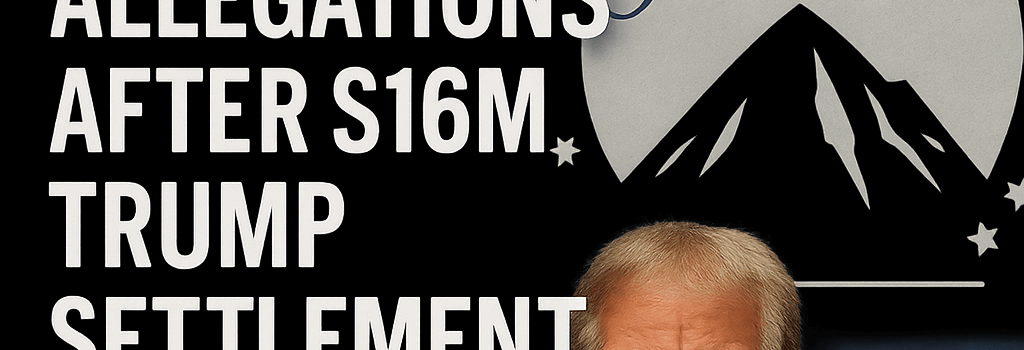Paramount Faces Bribery Allegations After $16M Trump Settlement

Background of Lawsuit and Settlement
On July 2, 2025, Paramount Global—parent company of CBS—announced a $16 million settlement to resolve a defamation lawsuit filed by former President Donald Trump and Representative Ronny Jackson in the Northern District of Texas. Trump alleged that a 60 Minutes report deceptively edited his pre-election interview with then–vice presidential candidate Kamala Harris. Though legal experts widely characterized the suit as frivolous, Paramount cited the need to clear regulatory hurdles for its proposed $8.4 billion merger with Skydance Media as a key factor in opting to settle.
Key Terms of the Settlement
- Total Payment: $16 million, including plaintiffs’ fees and costs.
- Allocation: Net proceeds (after legal fees) earmarked for Trump’s future presidential library; no funds disbursed directly to Trump or Jackson.
- Apology Clause: No statement of apology or admission of wrongdoing by Paramount or CBS.
- Editorial Compliance: Going forward, 60 Minutes will publish full, unedited interview transcripts for eligible U.S. presidential candidates, subject only to legally required redactions.
Regulatory Landscape and Merger Approval Process
The settlement arrives amid an intensive review of Paramount’s pending acquisition of Skydance. Under Section 310(d) of the Communications Act, the Federal Communications Commission (FCC) must approve any transfer of broadcast licenses. FCC Chair Brendan Carr, a Trump appointee, had placed negotiations on hold pending resolution of a separate “news distortion” complaint regarding the Harris interview.
- FCC Complaint Revived: The complaint alleges selective editing of two distinct answers by Harris into a misleading portrayal. CBS provided unedited transcripts, raw camera feeds, and closed-caption metadata, but Chair Carr indicated these were insufficient.
- Hart-Scott-Rodino Review: The U.S. Department of Justice continues an antitrust review under HSR regulations, focusing on market concentration in streaming and theatrical distribution.
- Expected Timeline: Insiders report FCC staff aim to complete technical audits and issue a Notice of Apparent Liability by Q3 2025, with final agency vote thereafter.
Technical Analysis of Interview Manipulation Claims
Media forensics expert Dr. John Smith from the Institute for Broadcast Integrity dissected the raw footage. Using forensic video analysis tools (e.g., Amped FIVE), Smith demonstrated that the two Harris responses were recorded within the same question window but spanned different timestamp offsets: one at 00:13:24.5 and the other at 00:13:29.1. Codec data (H.264) and time-code metadata confirm there was no substantive cut or reordering of camera angles beyond standard multi-cam editing.
“Paramount’s transparency in providing uncut footage and VITC metadata effectively debunks the selective-editing narrative,” said Smith. “Network compliance engineers use similar logs daily to validate closed-caption accuracy and O&O station QC checks.”
Implications for Independent Journalism and First Amendment Protections
Legal scholars underscore the broader impact of the settlement on press freedom. Professor Jane Doe of Columbia Law School warns that allowing a public official to extract multimillion-dollar payments—even to a library—risks chilling investigative reporting.
- Defamation Standards: Under New York Times v. Sullivan, public figures must show “actual malice.” Experts agree Trump’s complaint lacked evidence of knowing falsity or reckless disregard.
- Precedent Risk: A successful settlement could embolden future public-figure lawsuits aimed at suppressing unfavorable coverage.
Senator Elizabeth Warren (D-Mass.) has called for a federal investigation under 18 U.S.C. § 201 (Bribery of Public Officials). “This is bribery in plain sight,” she stated, citing correspondence from Senators Sanders and Wyden demanding transparency on whether any anti-bribery statutes were violated.
New Legislation and Policy Proposals
Warren announced plans to introduce the Presidential Library Transparency Act, which would:
- Cap corporate contributions to presidential libraries during a president’s term.
- Require public filing of all proposed donations exceeding $100,000.
- Author federal oversight by the National Archives and Records Administration.
Concurrently, the Freedom of the Press Foundation has signaled intent to pursue a shareholder derivative suit against Paramount’s board for alleged breaches of fiduciary duty.
Latest Developments and Outlook
As of late July 2025, FCC Chair Carr has indicated the news-distortion probe will be closed upon formal settlement approval, clearing the path for the Skydance merger vote. Meanwhile, the DOJ’s HSR antitrust review remains active, with a likely outcome of conditional approval, including divestitures of overlapping streaming assets.
Paramount’s management insists the agreement is “completely separate” from regulatory approvals. Still, industry observers note the timing aligns suspiciously with merger deadlines and shareholder pressure.
Conclusion
The $16 million settlement resolves a high-profile defamation suit but opens broader debates on media transparency, regulatory leverage, and the health of independent journalism. With multiple investigations and proposed legislative reforms underway, the industry is watching closely to see whether this episode reshapes the balance between press freedom and political power.